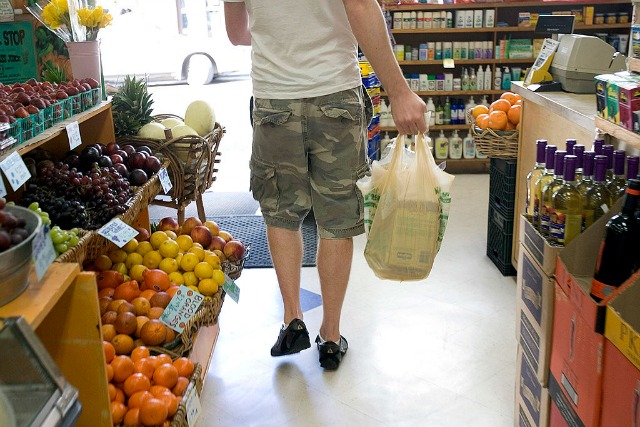After Bag Tax, Chicago Is Using A LOT Fewer Plastic Bags, Study Says
By Stephen Gossett in News on Apr 24, 2017 9:33PM

Getty Images / Photo: David Paul Morris
Ever since the city switched over to a BYOBag policy beginning in February, hitting shoppers with a 7-cent per bag tax, Chicago is cutting way back on the disposable bags.
Use of throwaway bags is down 40 percent, according to a preliminary results of a new study from ideas42, a behavioral design lab and researchers, and researchers at New York University and the University of Chicago Energy & Environment Lab.
Before the controversial bag tax went in effect, shoppers averaged a little more than two bags per shopping trip (2.3) at stores examined in the study. Over 80 percent of people used at least one disposable bag every trip. But post-implementation, only about one bag was used per shopping trip; and fewer than half of people used a single-use bag at all. Desired effect achieved, it appears.
A correlative rise in use of non-disposable bags followed, too, as one might also expect. Use of reusable bags shot up from just 13 percent all the way up to 33 percent, the study found. The study followed bag-use patterns in large grocery chains in the Chicagoland area.
"I am glad so many Chicagoans are choosing to forgo paper or plastic bags at checkout, and encourage others to help Chicago further reduce disposable bag use in the city,” bag-tax champion and Mayor Rahm Emanuel said in a press release. "By decreasing our paper and plastic bag use, Chicago is making important progress in reducing our carbon footprint as well as reducing street litter and improving recycling operations.”
The City Council passed the bag tax in November after scrapping an original push to ban plastic bags outright. A one-month reprieve was granted between January and February to allow retailers to adjust charging mechanisms to their POS terminals. Five cents of the bag tax goes to the city; the rest goes to the retailer.
Exceptions to tax include restaurant takeout bags, prescription drug bags and large garment bags.